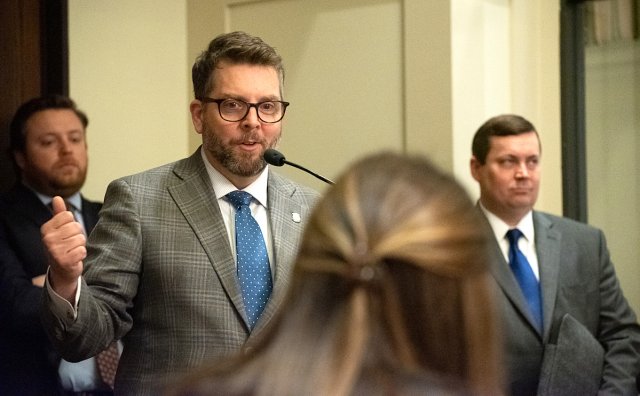
When Marcus McEntire challenged and defeated incumbent GOP Rep. Dennis Johnson in 2016, he had an unusual priority for an Oklahoma Republican legislative candidate: improve access to health care, even if it meant expanding Medicaid.
“I believe Medicaid expansion appeals to the middle, but sometimes this building doesn’t look for middle-ground solutions,” McEntire (R-Duncan) said Monday in his office. “Expanding Medicaid in the Affordable Care Act is politically a boogerbear — I guess you could say — for Republicans.”
Country colloquialisms aside, the phrase “Medicaid expansion” was so tied to the politically pejorative term “Obamacare” that in 2013 even Oklahoma’s leading health care advocacy groups vowed not to utter it in their legislative lobbying efforts.
Instead, hospital administrators and other stakeholders pitched “a plan for Oklahoma” that would have leveraged Medicaid expansion dollars to broaden Insure Oklahoma, a program that uses public money to let small businesses enroll their employees in private health insurance. A Twitter account called “A Plan for Oklahoma” still exists but has not tweeted since 2016, the year a proposed shift to private insurance subsidies dubbed the “Medicaid Rebalancing Act” stalled at the end of session and left roughly $900 million in annual federal health care dollars untapped by Oklahoma’s political leaders.
“I do believe this should have been done a long time ago,” McEntire said.
SQ 802: No additional ‘restrictions’ or ‘eligibility’ requirements
McEntire is not the only Oklahoman who feels that way. In 2019, more than 300,000 people signed an initiative petition to create State Question 802, an expansion of Medicaid to cover adults earning up to 133 percent of the federal poverty level. SQ 802, however, would codify its Medicaid expansion in the Oklahoma Constitution, along with a caveat:
No greater or additional burdens or restrictions on eligibility or enrollment shall be imposed on persons eligible for medical assistance pursuant to this article than on any other population eligible for medical assistance under Oklahoma’s Medicaid program.
That policy proviso troubles McEntire and other pro-Medicaid expansion Republicans elected after 2016.
“I fear that SQ 802 would limit our ability to incentivize healthy behavior. If we want people to go get screened and we required that, or if we said, ‘We want [diabetics] to go to the doctor two times a year,’ we couldn’t do that unless we do it to the traditional population as well. That’s really concerning,” McEntire said. “You would think if you are doing something good for people and are trying to improve health outcomes that it wouldn’t be a problem, but who knows?”
Amber England, the campaign manager for Yes on 802, said health care organizations and the public in general were “tired of waiting” on the Legislature to expand Medicaid and cover between 150,000 and 200,000 low-income adults. She called SQ 802 the “gold standard for expanding Medicaid” and said it proposes a constitutional amendment for a simple reason.
“It’s done that way so that politicians can’t dismantle it on a whim in election years,” England said. “It keeps it out of the hands of politicians, and I think that’s because voters don’t trust politicians with their health care.”
Patti Davis, president of the Oklahoma Hospital Association, agreed.
“We know that you have to cover the 10 essential health benefits,” Davis said. “So literally there is nothing that would prevent the state in adding to those programs or modifying them in a proactive manner. The Legislature will be responsible for the establishment of rates, the whole nine yards. There’s still going to be a lot of interaction there between the Legislature and the Oklahoma Health Care Authority for the establishment of this program.”
Gov. Kevin Stitt has yet to place SQ 802 on a statewide ballot, something he must do this year.
Legislative ‘regret’ if SQ 802 passes?
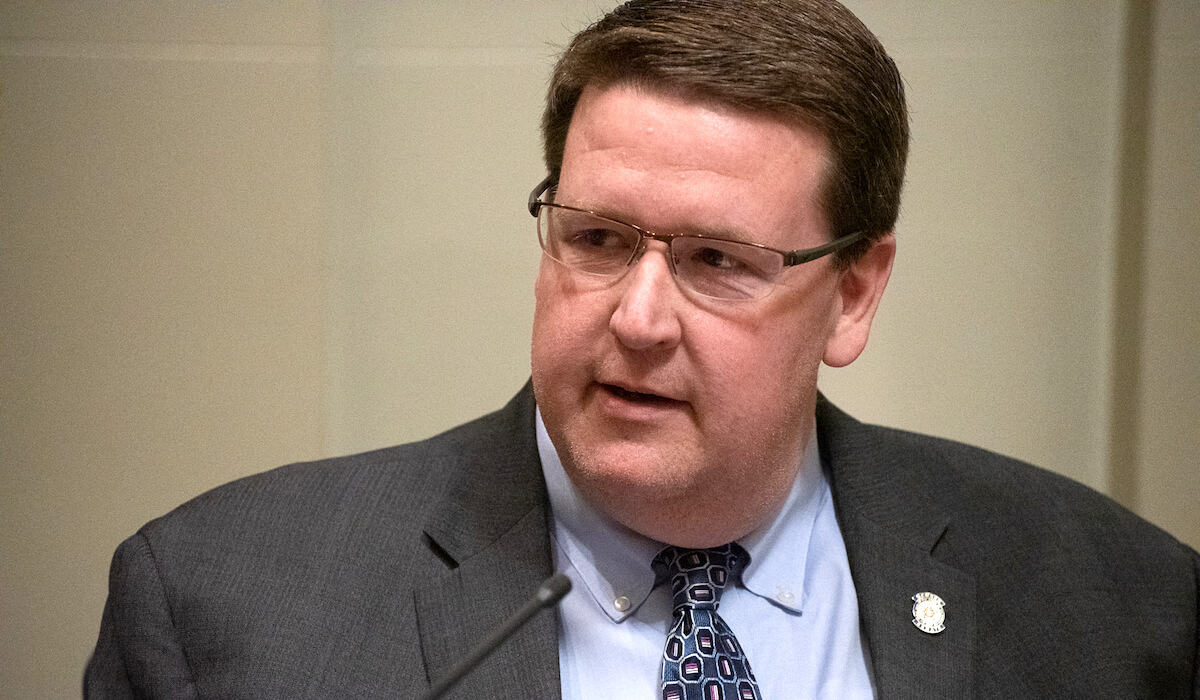
For the past two years, Sen. Greg McCortney (R-Ada) has worked closely with McEntire to push a legislative agreement to expand Medicaid. At the time, their efforts were supported by the OHA and other health care groups.
“I think if the state question passes, the Legislature will look back with regret that they didn’t get something done earlier,” McCortney said.
Despite McEntire and McCortney’s efforts at educating their numerous colleagues who also joined the Legislature over the past four years, an acrimonious budget battle and subsequent teacher walkout sucked most of the air out of the Capitol in 2017 and 2018.
In 2019, Republican legislators had more appetite and opportunity to fund a version of Medicaid expansion through an increase in Supplemental Hospital Offset Payment Program (SHOPP) fees, but Gov. Kevin Stitt’s administration sought first to audit the Oklahoma Health Care Authority, which oversees the state’s Medicaid program, dubbed SoonerCare. Stitt also wanted the Legislature to give him power to hire and fire OHCA’s director, a statutory change he was granted for five large agencies.
“While I wouldn’t say Medicaid expansion wasn’t on his radar, it was just maybe something that wasn’t as high a priority as him fulfilling his executive wishes on getting control of the big five agencies,” McEntire said. “And honestly, if I were him, I would want control of those agencies before I expanded Medicaid.”
This year is a different story. On Jan. 30, Stitt announced his intention to expand Medicaid while also pursuing a new block-grant waiver made available by the Centers for Medicare and Medicaid Services under President Donald Trump. Medicaid block grants have been a controversial proposal in the past, and some believe the idea stands in legal conflict with the federal Medicaid statute.
Stitt said Tuesday “the timing is perfect” for Oklahoma to pursue the block grant proposal, which he has dubbed SoonerCare 2.0.
“I’ve listened to Oklahomans,” said Stitt, who opposed Medicaid expansion on the 2018 campaign trail. “They do want more federal dollars in our system, but this is the conservative way to do it with SoonerCare 2.0.”
Stitt said his team is planning to submit its state plan amendment and Healthy Adult Opportunity waiver application to CMS by the end of February. The state plan amendment expanding Medicaid is expected to be processed quickly, but waiver applications typically take between six and 18 months.
“The people who are currently on Medicaid are fine,” Stitt said. “This [waiver is for] the new population. I’m going to bring $1 billion more into our state, but it’s with skin in the game, so moderate premiums and also work requirements. SQ 802 is the wrong approach to expand Medicaid because it’s in our constitution. We don’t have any flexibility whatsoever.”
Asked if his predecessor and previous iterations of the Legislature should have struck a deal on Medicaid expansion and program waivers — like managed care — years ago, Stitt sidestepped the hypothetical.
“I don’t know if they weren’t able to, it’s just a great opportunity with the Trump administration,” he said. “That’s why I went to DC and rolled out Trump’s plan. He really made it possible with this Healthy Adult Opportunity plan to have these waivers.”
If SQ 802 were to pass after Stitt’s waiver is accepted by CMS, it’s not fully clear how much of his proposal would be nullified. SQ 802 proponents say the state has already sought a work requirement for the general Medicaid population, but Republican legislators and the governor say it would undermine Stitt’s efforts substantially.
SoonerCare 2.0: Stakeholders want ‘more information’
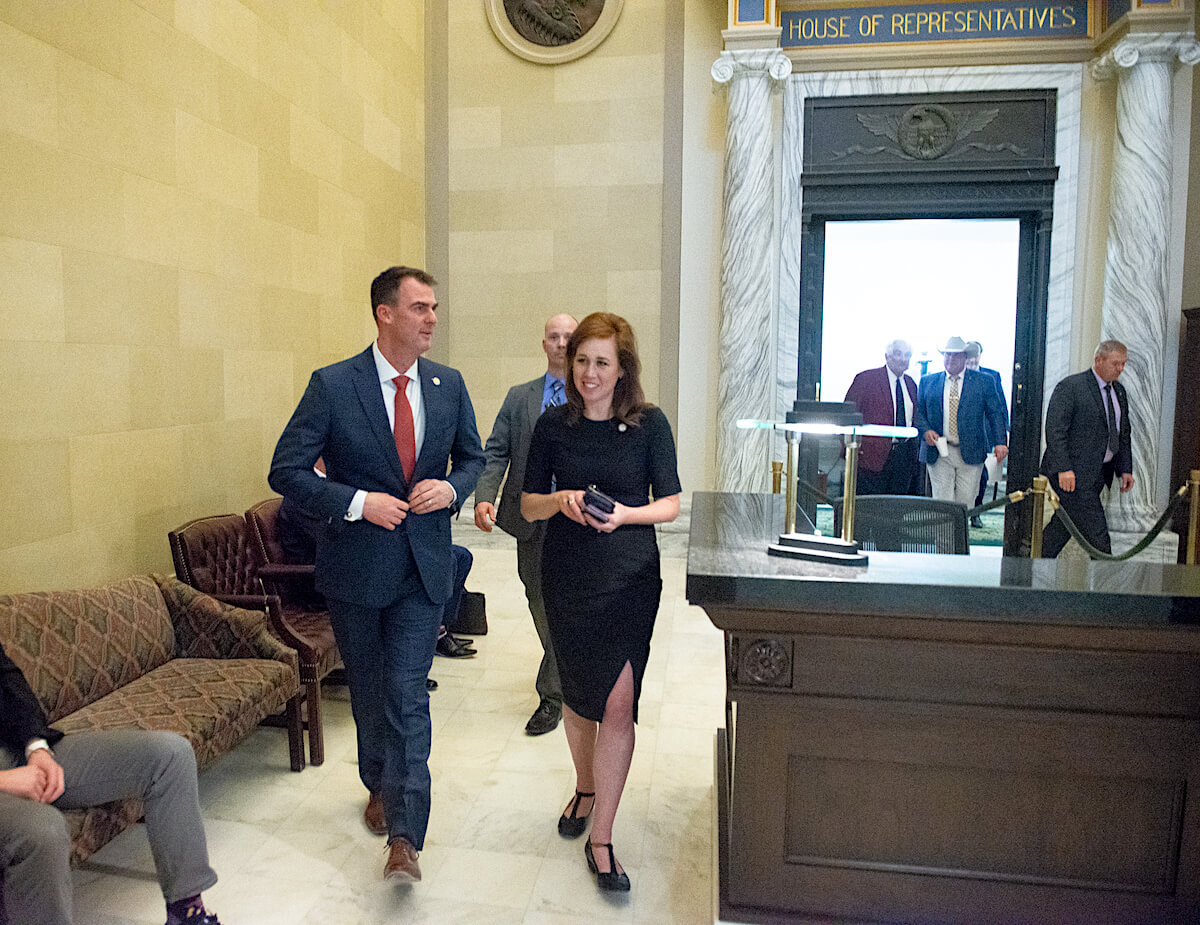
What exactly Stitt’s block grant waiver application will look like also remains unclear, a fact that has stressed some legislators and Davis of the Oklahoma Hospital Association. She said the OHA first met with Stitt about his plan only after his Washington announcement.
“We would love to have more information on what the governor’s plan contains,” Davis said. “What concerns us greatly is the way in which this proposal was created. Clearly what we are trying to put together is from what we’ve read in print and other media and the governor’s press releases. We haven’t seen a lot of specificity.”
McEntire, chairman of the House Appropriations and Budget Health Subcommittee, also said he is awaiting more information.
“The details have been scant as far as the managed care portion of it, which has hospitals worried,” McEntire. “Using some of the SHOPP payments for it has them concerned, and rightly so. If I were them, I’d be concerned, too, because right now they don’t have any certainty.”
McEntire said the Legislature will have to fund either plan — by increasing the SHOPP fees paid by hospitals — but he praised the details he does know about Stitt’s proposal.
“On the premium side, I don’t care if a doctor is a Democrat or a Republican,” he said, “they all will tell you that when people have a little investment in what they are doing, their compliance is better, their literacy is better, they take on a responsibility in their own health. I think the premium part is really crucial, even though it’s very modest. It’s capped at 5 percent of their income.”
House Minority Leader Emily Virgin (D-Norman) said she wants more information about Stitt’s proposal, but overall she supports SQ 802 regardless of how it interacts with the governor’s ultimate proposal.
“I think it would have been much better for the Legislature to take care of this years ago, but the fact of the matter is we didn’t and we still haven’t, so the voters are probably going to take care of it this year,” Virgin said. “Putting [Medicaid expansion] in the constitution doesn’t mean the Legislature won’t have a responsibility to form policy around this issue and certainly a responsibility to fund it because the funding mechanism is not in the constitutional question.”
Virgin on past inaction: ‘It just comes down to partisan politics’
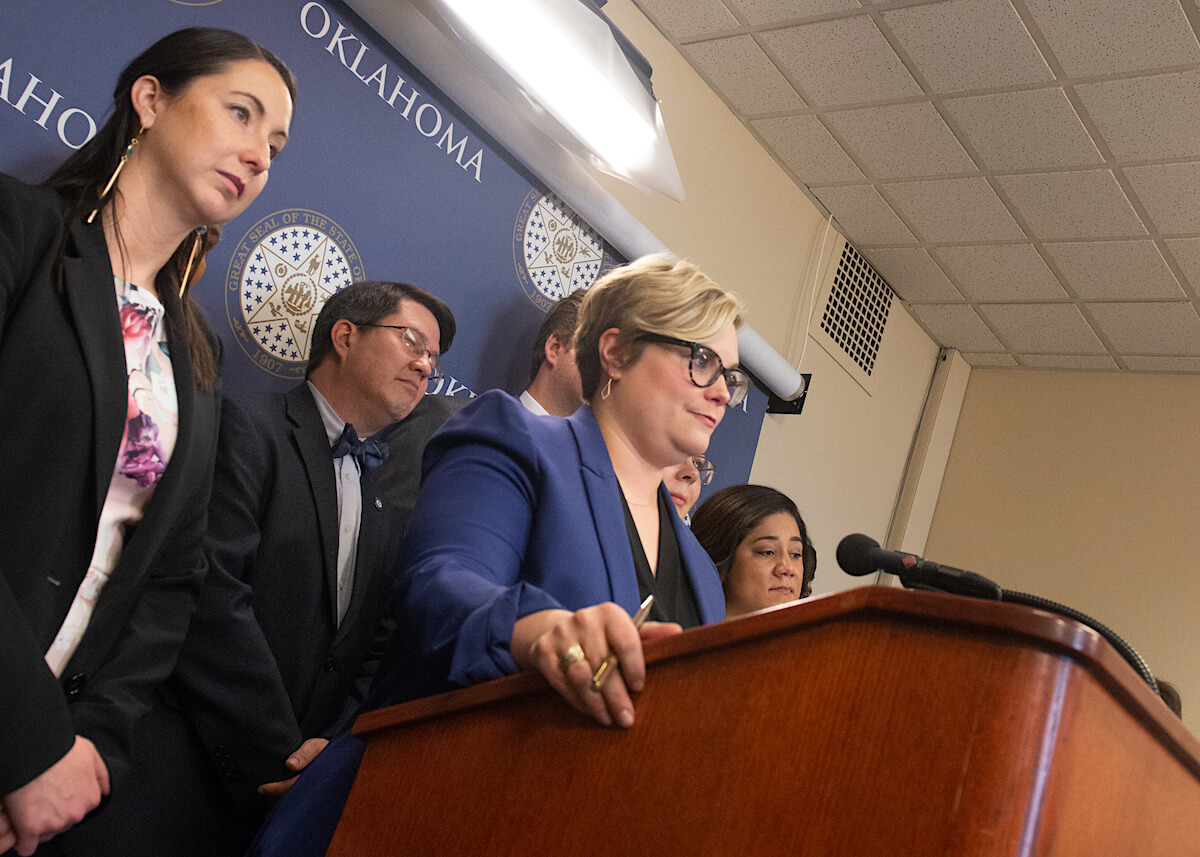
While Virgin, Davis and England say SQ 802 will still allow the Legislature and the Oklahoma Health Care Authority flexibility in administering an expanded Medicaid program, the two men who lead the House and Senate disagree.
“The bottom line on SQ 802 is there’s just no flexibility going forward without putting something on the ballot to go back to the people again, which is just not easy to do,” House Speaker Charles McCall (R-Atoka) said Monday. “The power always resides with the people of the state. But I certainly feel like on SQ 802, it’s going to tie the hands of those they elect to come represent them to be able to address health care going forward.”
Virgin, however, said Republican legislators have not represented the needs of their hospitals, health care providers and constituents.
“The Legislature doesn’t really have a right to say one way or another whether it should be in the constitution because, frankly, it’s our fault that it’s there,” Virgin said. “It just comes down to partisan politics. It was something that was proposed by [former Gov. Mary Fallin’s] administration to accept the federal funding and do it in an ‘Oklahoma plan,’ but essentially extreme groups came out in opposition to this. Even [former Sen. Tom Coburn] came out in opposition to it, and then I think, frankly, Republicans got scared that they wouldn’t get re-elected if they did this, so that plan was put to the side. Then we didn’t do anything.”
Senate President Pro Tempore Greg Treat (R-OKC) said blaming partisanship for Oklahoma’s delay in pursuing Medicaid expansion “would be the very cynical view on it.”
“There are philosophical differences on how much the government should be involved in health care. Obamacare or the Affordable Care Act, obviously I have a long record of opposing that,” said Treat, who worked for Coburn when the ACA became law in 2010.
Years later, Treat watched with hope that a Republican Congress would repeal and replace the ACA.
“The wind was really taken out of our sails when the late Sen. John McCain went onto the Senate floor and cast a vote against repeal and replace,” Treat said. “We had real hope that we were going to be able to overturn a complete government takeover of health care. And no disrespect to the late senator, but our hope was kind of lost that the U.S. Senate and U.S. House would solve our problem.”
McCortney, the Senate Health and Human Services Committee chairman, also panned the “partisan politics” perspective.
“Yes, that’s absolutely what it looks like, but the reality is that the opinions of Oklahomans have changed over those 10 years also,” McCortney said. “You see that if you look at our (Senate) Republican Caucus. The most senior members were elected in the middle of that wave of ‘Obamacare is the worst thing ever in the history of the world.’ But as the years have gone on, the opinions of Oklahomans — both Republicans and Democrats — have changed.”
He, Treat and McCall referenced other discussions on Medicaid expansion over the years.
“We’ve definitely been looking for a solution for a while. We really needed some indication at the federal level if there would be additional alternatives offered to states who have accepted it,” McCall said. “There is definitely a willingness — and there has always been — to have robust health care in the state of Oklahoma. There is a population in our state that doesn’t have the means to access health care. I believe we need to take care of those people. I think we need to take care of the working poor as well.”
Davis, the OHA president, believes that as well and supports SQ 802 as a result.
“We think it’s definitely more straightforward. We know that the Healthy Adult Opportunity (block grant) is a brand new concept and it may be legally challenged,” Davis said. “While we know the governor wants to fast-track and get [his] plan in quickly and is very optimistic in terms of an implementation date, we will see if that comes to fruition.”
McCortney: ‘A massive burden on our hospitals’
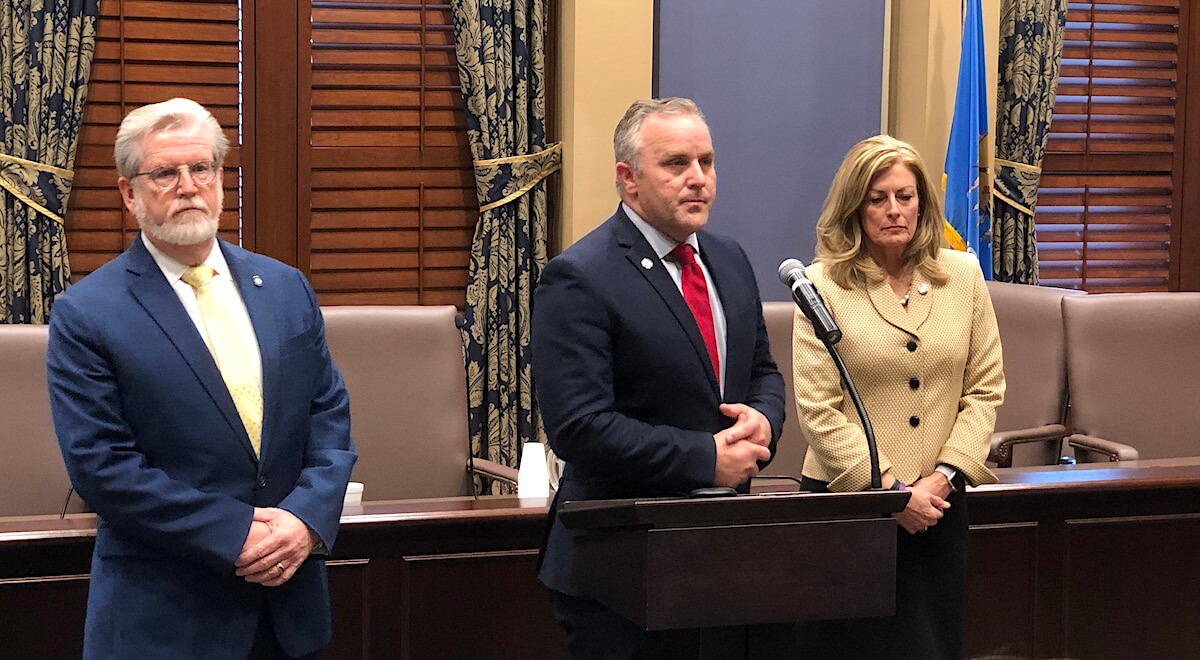
What didn’t come to fruition over the past nine-plus years of the Oklahoma Legislature was a Medicaid expansion agreement. McEntire said that’s unfortunate.
“Things would be markedly different. Meth addiction, mental health stuff — a lot of that is uninsured adults,” he said. “But we are treating it with 100 percent state dollars. Well, we could have been doing that this whole time with only $.10 from the state of every $1 (spent).”
Even more troubling to McEntire were the effects on Oklahoma hospitals. Lost among the headlines and politics of the past decade has been important background on how Congress crafted the ACA budgetarily, which partially involved decreasing Medicare reimbursements for end-of-life care like home health and hospice. The American Hospital Association agreed to support the ACA despite those cuts on the basis that mandatory Medicaid expansion would, in turn, offer a steady reimbursement mechanism for uninsured low-income adults prone to emergency room use and chronic conditions.
But in 2012, the U.S. Supreme Court ruled states could not be forced to expand Medicaid. Oklahoma and other Republican-led states chose not to, despite CMS picking up 100 percent of the cost for the first three years. The law prescribed for each state’s share to slowly rise to 10 percent.
“For years now, our hospitals have been paid at a lower rate on the assumption that they would be getting income for the people that remain unfunded in Oklahoma,” McCortney said. “We’ve played on an uneven playing field in Oklahoma since the Affordable Care Act passed because we took the cuts, but we didn’t get the increased revenue coming in from a lower uninsured rate.”
McCortney, who agreed with McEntire that SQ 802 would be too restrictive, called the situation “a massive burden on our hospitals.”
“My hospital in Pauls Valley closed last year, and this was no doubt a contributing factor,” said McCortney, a former hospice company owner. “There’s a segment of my district that doesn’t have hospital and emergency room access because of this.”
McEntire echoed the sentiment.
“My hospital in Duncan is a nonprofit hospital. They take everybody. They are compelled by law to give them care, and usually when they come in they have put it off and put it off, so they are very sick. They are acute, and the hospital must treat them, and they’re uncompensated for that,” McEntire said. “It’s hard on the hospitals, but it’s even harder on the individual because they have nowhere to go. So they finally go to the hospital when they are incredibly ill. They’re in a much worse situation, and we all end up paying for it. It all comes full circle.”
Treat said lawmakers should focus on what’s best now for Oklahoma in 2020.
“I’m not one that likes to look in the rearview mirror a lot,” Treat said. “We had our opportunities. For different reasons it didn’t advance. We are where we are right now. We are looking out the front windshield and looking at a potential election on this question that I think would be detrimental because it wouldn’t give policy makers the flexibility to change as realities change in Oklahoma. That’s the reason I’m opposed to it. I’m not opposed to trying to increase access, and we are working toward that end. We will see.”
(Editor’s note: The Oklahoma Hospital Association has donated money to NonDoc through charitable sponsorship in 2020.)





















